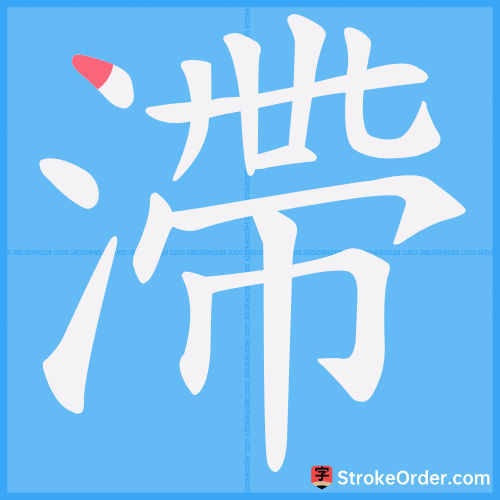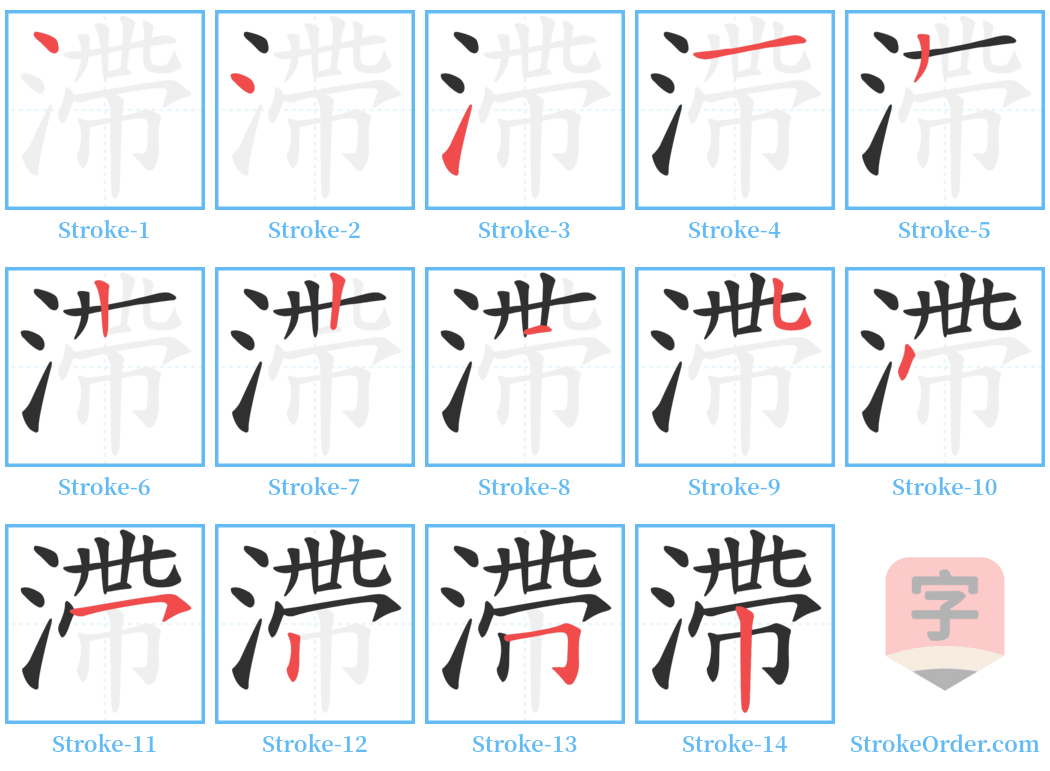滯 Stroke Order
Animated Stroke Order of 滯

Stroke Order Diagrams for 滯

Step-by-Step Handwriting Guide for 滯

Learn to Write Chinese Characters with Video Tutorials
Watch the video of writing the Chinese character "滯", learn the correct stroke order (笔顺) of the character "滯", and master the standard way of writing the character "滯".
Free Printable Handwriting Practice with Stroke Order: 滯
Printable Writing Practice Worksheet of "滯" in Portrait Orientation (Tian Zi Ge)

Printable Writing Practice Worksheet of "滯" in Landscape Orientation (Tian Zi Ge)

Information of 滯
Pinyin
zhì
Radical
氵
Strokes
14 strokes
Usage
★★★
Definition
sluggish
滯 (zhì)
1. To stagnate, to be not flowing, to be inflexible.
2. To be left behind or omitted.
1. To stagnate, not to flow, inflexible: Stop stagnation. Retain stagnation. Stagnation in sales. Stagnation in vacancy. Stuck stagnation. Stagnation during childbirth (more than 30 hours during labor).
2. To be omitted: "There are left-behind ears."
滯 (zhì) [verb]
[Original meaning]: Water flow not smooth.
[Character formation]: Phonetic-semantic compound. From water, with sound.
1. Same as original meaning (Stagnant)
References:
- "Shuo Wen": 滯 means to condense.
- "Zhou Li": Things that are rare and have stagnation.
- "Chu Ci": To stay in the water and become stagnant.
- "Huai Nan Zi": Flow yet not stagnate.
2. Overstock, long-term accumulation not processed.
References:
- "Zhou Li": To collect the goods not sold, the stock stuck in people's usage.
- "New Tang Book": The Ministry of Personnel has unresolved cases, which should be dealt with.
Example: Stagnation in jail (cases that are piled up or delayed without decision); Stagnation in lawsuit (piled-up lawsuits); Stagnation in goods (stocks piled up).
3. To stop; to be blocked; to be motionless; to be at a standstill.
References:
- "Huai Nan Zi": Thus, able to make the heavens operate and the earth stagnate, wheels turn without waste.
Example: Stagnation in use (stop using); Stagnation in congestion (blocked, not smooth); Stagnation in crossing (blockage); Stagnation in discharge (blocked; unable to vent).
4. To smolder.
References:
- "Guo Yu": Qi does not sink and stagnate. Note: "accumulation."
- Song, Su Shi: Gaining this fine work, all day long happily, smoldered with bitterness melted away.
Example: Stagnation in thought (thoughts stuck in the heart); Stagnation in anger (accumulated anger); Stagnation in qi (blocked air); Stagnation in resentment (accumulated resentment).
5. To condense, to coagulate.
References:
- "Lu Ji": Much smoldered thought, placing wine and banquet to rejoice.
Example: Stagnant thoughts (condensed thoughts in the heart); Stagnant blood (stagnant blood); Stagnation at the bottom (condensed).
6. To be trapped; to be suppressed.
References:
- "Nan Shu": You are to be rich and noble, which should not be long trapped or oppressed.
Example: Stagnation in feather (metaphor for being in a predicament unable to show talent); Stagnation in suppression (being oppressed).
7. To temporarily stay at a place; to linger.
References:
- "Yao Hu": A few nights will linger because of the moon over the three rivers.
Example: Stagnation in pleasures (long-winded and lingering; long rain without stopping); Stagnation in travel (long stay without returning); Stagnation in guests (someone who has been in a low position for too long without promotion).
8. To be left behind; to be omitted.
References:
- "Poetry / Xiaoya / Da Tian": There are left-behind ears.
Example: Stagnation in talent (omitted and unused talent).
滯 (zhì) [adjective]
1. Long, long-term.
References:
- "Guo Yu": Dare to say long accumulation to relieve the tasks. Note: "long."
- "Later Han": Dizziness from prolonged illness, unable to wait long.
Example: Stagnation in disease (chronic illness); Stagnation in service (long-term service).
2. Slow response; lacking vitality, spirit, or effectiveness.
References:
- "Jin History": You are young, but your heart's strength is very sluggish.
Example: Stagnation in rolling (clumsy in speech and action); Stagnation in effort (not nimble).
3. Stubborn; obstinate.
References:
- Ming, Lu Kun: Good conscience does not stagnate in seen and heard matters, but does not leave seen and heard.
Example: Stagnation in obstinacy (stubborn and unchangeable).
4. Abstruse; difficult to understand.
References:
- "Nan Shu": Hong Zheng is good at obscure sayings, both understanding Buddhist texts, even the most virtuous renowned monks ask difficult questions.
Example: Stagnation in rules (difficult to resolve laws); Stagnation in meanings (difficult meanings).